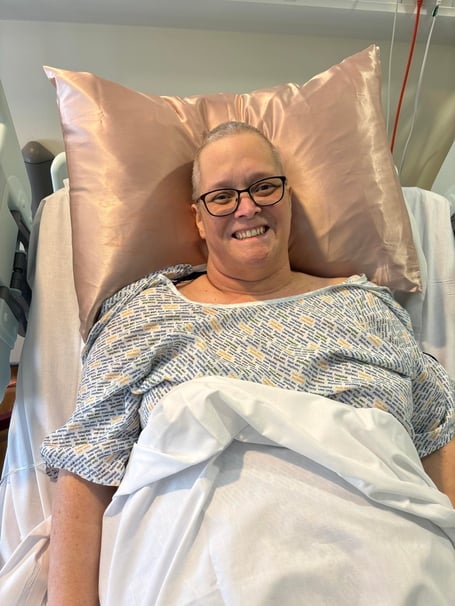A WOMAN was left unable to walk after her cancer symptoms were mistaken for menopause.
Karen Davey, 54, from Launceston started experiencing fatigue, hot flushes, and loss of appetite — leading her to believe she was experiencing symptoms of menopause.
After being hospitalised for two weeks, she was diagnosed with stage four non-Hodgkin lymphoma in her kidneys — with a tumour wrapped around her spinal cord.
Due to the spinal cord injury it caused, Karen cannot walk and is now a full-time wheelchair user.
In February 2024, when Karen began to feel more tired and achy than usual, she assumed she was experiencing symptoms of menopause, but by March, she had developed pain in her kidney.
When she visited the GP, she was told she had backpain due to gardening, despite only having done 20 minutes, well within her capabilities.
Over the next two months, her symptoms worsened. Karen felt her symptoms were being dismissed by her GP.
Karen had stopped eating properly, was losing weight, developed a temperature, and she eventually lost all sensation in her legs and lost bladder and bowel function.
After being hospitalised for two weeks, she was diagnosed with stage four non-Hodgkin lymphoma in her kidneys, with a tumour wrapped around her spinal cord.
After one round of radiotherapy and six rounds of chemotherapy, Karen is in complete remission, but her tumour has had life-changing effects. Due to the spinal cord injury it caused, Karen cannot walk and is now a full-time wheelchair user.
Since returning home from hospital in February 2025, Karen, who works as an administrator for an online psychiatry company, has had to reduce her hours to eight hours a week, while her husband has had to give up work altogether to become her fulltime carer.
For Karen, the delay in getting a diagnosis is particularly frustrating, and she is keen to spread awareness of her situation to help others who may experience something similar.
Karen said: “I had no idea that hot flushes would lead to all this.
"The symptoms you’ve got aren’t always menopause symptoms, and we need to be more mindful of that.”
Karen was put in touch with Spinal Injuries Association while in hospital.
The national charity supports people living with spinal cord injuries and is currently running a women’s health campaign, advocating for better access to medical settings for disabled women.
Dharshana Sridhar, campaigns manager at Spinal Injuries Association, said: “Karen’s story is a powerful reminder that women’s health symptoms should never be dismissed or explained away without proper investigation.
"Too often, women with spinal cord injuries face delays in diagnosis and unnecessary barriers to equitable care, leaving them to cope with life-changing consequences that could have been prevented.
"Across the board, women’s concerns are frequently overlooked and when disability or other intersecting factors are involved, the barriers to timely diagnosis and treatment become even greater.
"Through our women’s health campaign, we’re calling for better awareness, earlier diagnosis, and accessible healthcare for every woman, no matter her disability."



.png?width=209&height=140&crop=209:145,smart&quality=75)

Comments
This article has no comments yet. Be the first to leave a comment.